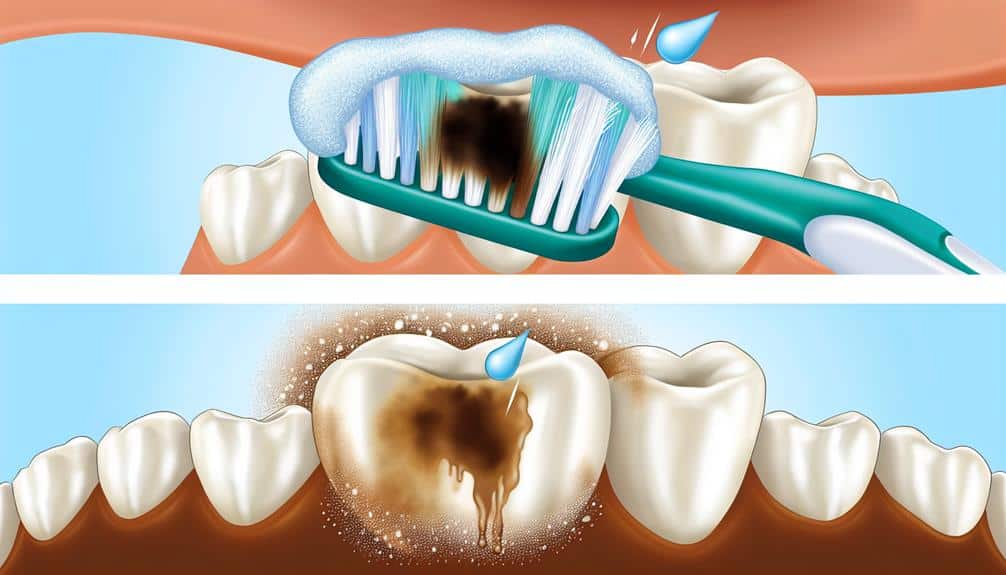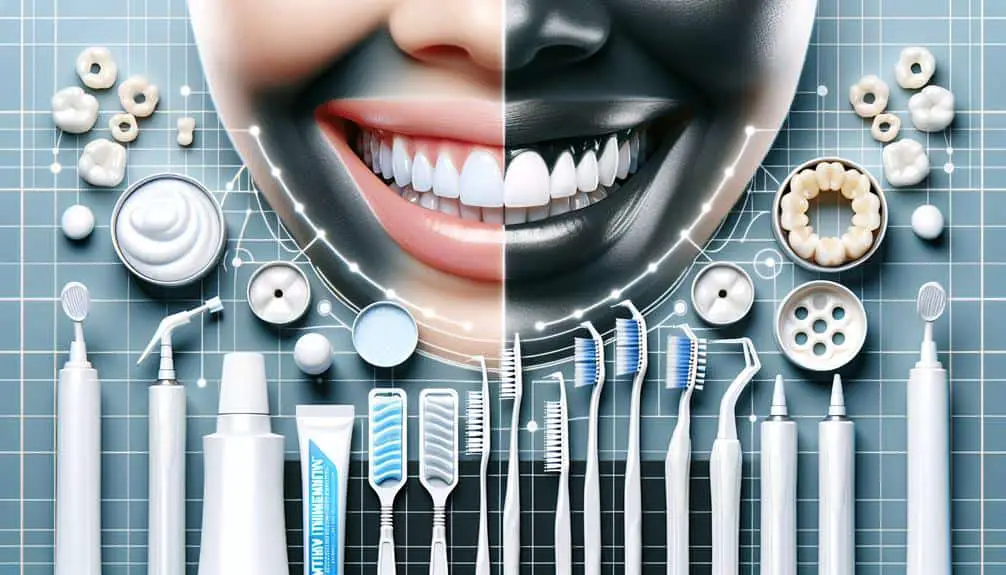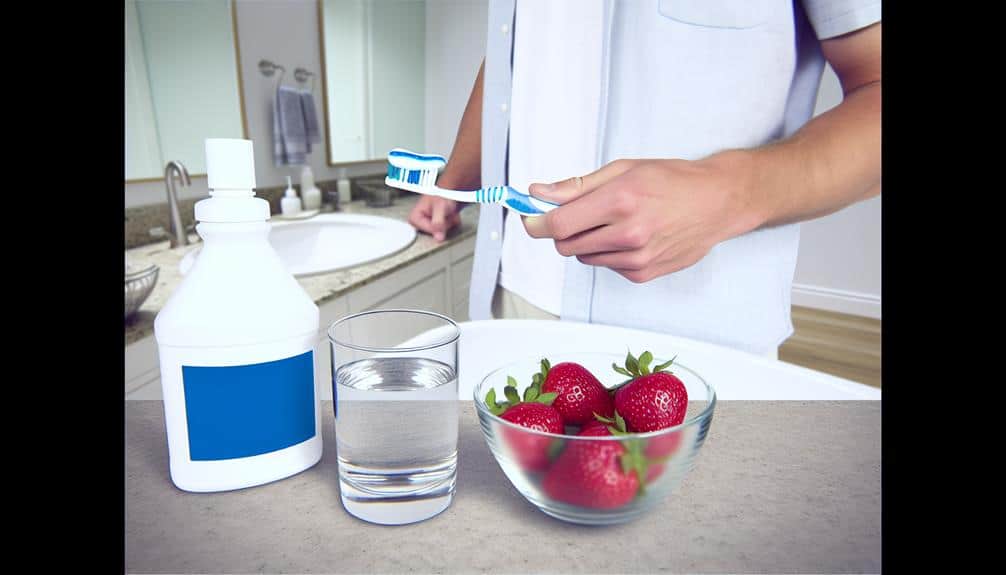If you're dealing with stubborn tooth stains, professional whitening treatments offer effective solutions. Consult your dentist for laser whitening, which provides enamel protection using professional-grade products for lasting effects. Incorporate whitening toothpaste and mouthwash with essential ingredients like fluoride and hydrogen peroxide. Consider exploring home remedies such as oil pulling or baking soda paste for tough stains.
For natural options, try oil pulling or strawberry and baking soda paste. Making lifestyle changes like a stain-limiting diet and proper oral care can also enhance your smile. Expert advice and detailed techniques can further assist in achieving your goal of a brighter smile.
Key Points
- Consider professional laser whitening for stubborn stains.
- Use whitening toothpaste with hydrogen peroxide and baking soda.
- Try home remedies like oil pulling and baking soda paste.
- Opt for natural solutions like strawberries and baking soda.
- Maintain oral hygiene with regular brushing and professional cleanings.
Professional Whitening Treatments
When considering professional whitening treatments for tooth stains, consult with a dentist to determine the most appropriate option for your specific needs. One of the most effective professional whitening techniques is laser whitening. This method provides professional results by using a specialized laser to activate the whitening agent on your teeth, resulting in a brighter smile.
Professional whitening treatments also provide enamel protection, guaranteeing that your teeth aren't damaged during the whitening process. The use of professional-grade products and the supervision of a dentist help to safeguard your enamel while effectively removing stubborn stains.
Furthermore, professional whitening treatments have long-lasting effects compared to over-the-counter products. The thorough application of whitening agents in a controlled environment ensures that your teeth remain whiter for an extended period. By opting for professional whitening treatments, you invest in both the immediate results and the lasting benefits of a radiant smile with minimal risk to your dental health.
Whitening Toothpaste and Mouthwash
Professional whitening toothpaste and mouthwash offer effective solutions for brightening your smile and combating tooth stains. When using these products, it's important to make sure you're maximizing their benefits through proper brushing techniques and taking care of your enamel health.
- Brushing Techniques: Proper brushing is vital for the effectiveness of whitening toothpaste and mouthwash. Make sure you brush for at least two minutes, covering all surfaces of your teeth. Use gentle, circular motions to avoid damaging your enamel.
- Enamel Health: Check the ingredients of the whitening products you choose. Look for fluoride to strengthen enamel and avoid harsh abrasives that can wear it down. Research product reviews to find options that are gentle yet effective in removing stains.
- Ingredient Effectiveness: Ingredients like hydrogen peroxide and baking soda are known for their stain-fighting properties. Be mindful of how these ingredients work on your teeth and consult with your dentist if you have any concerns about their effects on your enamel.
Home Remedies for Deep Stains
For tackling deep stains on your teeth, exploring home remedies can provide a natural and cost-effective solution. When dealing with stubborn discoloration, DIY whitening methods can be a game-changer. One effective technique is oil pulling, where swishing coconut oil in your mouth can help remove deep stains by binding to the plaque on your teeth.
Baking soda mixed with hydrogen peroxide forms a powerful paste that can penetrate and lift tough stains from the enamel. Additionally, rubbing the inside of a banana peel on your teeth can deliver minerals like potassium, magnesium, and manganese, which aid in deep stain removal.
Another popular home remedy involves creating a paste with lemon juice and baking soda. However, it's important to use this method sparingly as the acidity of lemon juice can erode tooth enamel over time. Activated charcoal is also a trendy option for deep stain removal, as it absorbs toxins and stains from the teeth.
Natural Whitening Solutions
To enhance the brightness of your smile, consider incorporating natural whitening solutions into your dental care routine. These DIY whitening tricks and herbal remedies can be effective in combating stubborn tooth stains. Here are some natural whitening solutions you can try:
- Oil Pulling: Swishing coconut oil or sesame oil in your mouth for about 15-20 minutes daily can help remove plaque and lighten teeth naturally.
- Baking Soda Paste: Mixing baking soda with a small amount of water to create a paste and brushing your teeth gently with it can help polish away surface stains.
- Strawberries and Baking Soda: Mashing strawberries and mixing them with baking soda to form a paste can be a natural way to whiten teeth due to the malic acid in strawberries that helps break down stains.
Incorporating these natural whitening solutions into your oral hygiene routine can be a cost-effective and gentle way to achieve a brighter smile.
Lifestyle Changes for Brighter Teeth
Consider making simple adjustments to your daily habits to promote brighter teeth and a healthier smile. Diet modifications play an important role in maintaining the brightness of your teeth. Limiting the consumption of staining foods and beverages such as coffee, tea, red wine, and dark berries can prevent new stains from forming.
Additionally, incorporating crunchy fruits and vegetables like apples, carrots, and celery into your diet can help naturally clean and whiten your teeth by stimulating saliva production and scrubbing away surface stains.
Improving your oral hygiene habits is vital for achieving and maintaining a bright smile. Brush your teeth at least twice a day with a fluoride toothpaste to remove plaque and surface stains. Floss daily to clean between your teeth and prevent stains in hard-to-reach areas.
Consider using a whitening mouthwash or visiting your dentist for professional cleanings to enhance the brightness of your teeth. By making these lifestyle changes, you can effectively combat stubborn tooth stains and improve the overall appearance of your smile.
Frequently Asked Questions
Are There Any Specific Foods or Drinks That Should Be Avoided to Prevent Tooth Stains From Forming?
To prevent tooth stains, avoid staining foods and drinks like coffee, tea, red wine, and berries. Limit consumption or rinse your mouth after indulging. Regularly brush and floss, and consider using a straw for beverages to minimize contact with teeth.
Can Teeth Whitening Cause Tooth Sensitivity or Damage to the Enamel?
Whitening teeth has the potential to cause sensitivity or enamel damage, but using products with enamel protection features can help prevent this. It is crucial to prioritize enamel health to minimize side effects and maintain a healthy smile.
How Long Do the Effects of Professional Whitening Treatments Typically Last?
After professional whitening treatments, the longevity of whitening effects can vary, typically lasting from several months to a year. Consistent maintenance through proper oral hygiene practices and occasional touch-up treatments can help prolong results.
Is It Safe to Use Whitening Strips or Trays Purchased Over-The-Counter Without Professional Guidance?
Using whitening strips or trays bought over-the-counter can be important, but it's essential to contemplate potential risks to tooth health. Professional consultation guarantees safe usage of these DIY alternatives, safeguarding your oral well-being.
Are There Any Specific Oral Hygiene Practices That Can Help Maintain Whitened Teeth for a Longer Period of Time?
To maintain whitened teeth longer, follow these tips: brush and floss regularly, avoid staining foods/drinks, use a straw for beverages, schedule dental cleanings, consider touch-up whitening treatments. These prevention habits can help prolong the longevity of your bright smile.



